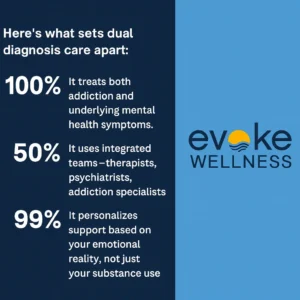Early sobriety can feel deceptively quiet.
You stop drinking or using—and suddenly, the nights feel longer. The phone stops ringing. The parties disappear. You’re left with a stillness you didn’t ask for and feelings you haven’t felt in years.
That kind of loneliness isn’t just uncomfortable—it can be overwhelming. It’s also incredibly common. At Evoke Wellness in Cohasset, MA, we talk to people every day who are trying to stay sober but secretly feel like they’re drifting. That’s why many find hope and direction through dual diagnosis treatment—care that supports both addiction recovery and the emotional pain that can come with it.
What Is Dual Diagnosis Treatment?
Dual diagnosis treatment is designed for people dealing with both substance use and a mental health condition. That could mean alcohol and depression. Cannabis and anxiety. Stimulants and PTSD. Often, people don’t even realize both are present until they start to examine their patterns more closely.
Here’s what sets dual diagnosis care apart:
- It treats both addiction and underlying mental health symptoms
- It uses integrated teams—therapists, psychiatrists, addiction specialists
- It personalizes support based on your emotional reality, not just your substance use
If you’re in early sobriety and feel isolated, numb, hopeless, or overwhelmed—it’s possible there’s more going on than withdrawal alone. Dual diagnosis care helps uncover those threads without judgment.
Why Is Loneliness So Intense in Early Sobriety?
Because addiction often acted as a buffer.
Before recovery, alcohol or other substances may have made social situations easier. They filled time. They muted sadness. They blurred the sharp edges of shame or regret. But once the substance is gone, what’s left behind can feel brutal.
You may feel:
- Disconnected from old friends
- Unsure how to connect without a drink
- Emotionally raw, sensitive, or anxious
- Like no one understands what you’re going through
That’s not weakness. That’s emergence. You’re coming back to life. And with the right support, that lonely ache can become something else—something useful, something honest, something temporary.
Can Dual Diagnosis Treatment Actually Ease the Loneliness?
Yes—and not just symptomatically.
Loneliness in early recovery isn’t only about being physically alone. It’s also about disconnection: from people, from purpose, and sometimes from yourself. That’s where dual diagnosis treatment comes in.
At Evoke Wellness at Cohasset, our programs help people:
- Rebuild emotional self-awareness
- Challenge negative self-beliefs (“I’m too broken to be loved”)
- Understand how depression or anxiety may distort social connection
- Learn how to tolerate discomfort without using substances
In other words: it helps rebuild your inner world, which often makes it easier to reach out, reconnect, and build healthier relationships—one that don’t depend on substances to feel safe.
What Kinds of Mental Health Conditions Often Coexist with Addiction?
Most people assume dual diagnosis means something severe. But in reality, the most common co-occurring issues in early recovery are quiet, chronic, and familiar:
- Depression: The low mood, numbness, and hopelessness that lingers even after detox
- Anxiety: Racing thoughts, overthinking social interactions, avoiding connection
- Trauma: Emotional flashbacks, nightmares, or feeling “stuck” in survival mode
- Bipolar Disorder or Mood Dysregulation: Highs and lows that feel extreme or unmanageable without substances
You don’t need a formal diagnosis to receive support. And dual diagnosis treatment isn’t about labeling you—it’s about understanding you. You are more than your symptoms, but your symptoms deserve care.
What If I’m Not Sure I Even Belong in Treatment?
That’s one of the most common feelings in early recovery.
Many people in early sobriety feel like they’re “not bad enough” to ask for help—or “too far gone” for help to work. Dual diagnosis treatment doesn’t require you to hit rock bottom. It meets you where you are. Whether you’ve been sober for two days or two months, if you’re struggling with emotional isolation or mental health symptoms, support is available.
Here’s what we hear from clients:
- “I thought I had to figure it out on my own.”
- “I didn’t think my loneliness ‘counted’ as a real problem.”
- “I didn’t know how to talk about feeling this empty.”
The truth? You don’t have to suffer in silence. If your loneliness feels unbearable, it’s worth paying attention to. And if you’re still sober, still trying, still waking up—there’s still something deeply right inside of you.
Will I Meet People Who Understand Me?
Yes. That’s one of the most transformative parts.
In dual diagnosis treatment, you’ll encounter others who also feel disconnected—but who are trying, just like you. And in that space, something happens: someone shares something that sounds like your story. You nod before you even realize it. You realize you’re not the only one who cried in the shower. You’re not the only one who said “I’m fine” while falling apart.
You don’t need a huge group of friends to feel less alone. Sometimes, just one moment of being seen can start to shift everything.
Can I Still Work on My Recovery If I’m Feeling Numb or Empty?
Absolutely. In fact, that’s when you need support the most.
Feeling emotionally flat in early recovery doesn’t mean you’re doing it wrong. It usually means your system is adjusting—relearning how to feel without the artificial spike of substances. This phase is often called the “emotional freeze” or “gray zone.”
Dual diagnosis treatment helps you:
- Understand your nervous system and trauma response
- Create structure that supports emotional balance
- Reconnect with small pleasures and meaning
- Normalize the weirdness of early emotional sobriety
You are not failing if you feel empty. You are healing. Even when it doesn’t feel like it yet.
What Does Dual Diagnosis Treatment Look Like at Evoke Wellness at Cohasset?
Our programs in Cohasset offer:
- Individual therapy with licensed clinicians
- Group therapy with others who understand dual recovery
- Medication support if needed (with your consent)
- Psychoeducation about mental health and addiction
- Safe spaces to explore grief, identity, and purpose
Everything we do is designed to help you feel safe enough to be real—and strong enough to stay that way.
What If I Still Feel Lonely Even in Treatment?
That’s okay too. Belonging is a process.
Dual diagnosis treatment doesn’t “fix” loneliness like a light switch. But it gives you what loneliness needs most: understanding, language, and shared experience. Over time, that combination builds something much more durable than distraction. It builds trust. It builds connection. It builds you—in your full, complex, worthy form.
You’re Not Broken—You’re Becoming
If you’re newly sober and lonely, please know this:
You are not broken. You are not weak. You are not the only one who feels like everyone else “got it” except you.
Loneliness in early sobriety is often the first real sign that you’re finally feeling again. And that means your capacity for connection—deep, authentic, sustainable connection—is waking back up too.
With dual diagnosis treatment at Evoke Wellness at Cohasset, we can walk with you through that in-between place. The silence. The ache. The not-yet-knowing.
You don’t have to navigate it alone.
Let’s make sure you don’t have to walk this path alone.
Call 866-931-6429 or visit our Dual Diagnosis Treatment page to learn how we support healing from both addiction and emotional isolation in early recovery.





